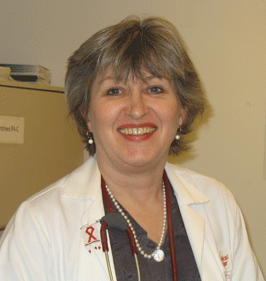Liza used to carry a pill bottle on her key chain.
The 49-year-old Omaha woman has AIDS, and says the key chain played an important role in helping her stick to her daily pill regimen.
“I take a handful of pills at breakfast, and another handful in the evening. Sometimes it’s hard to remember all those pills, or to make sure I take them on time. The key chain helped,” she said.
But Liza doesn’t need a key chain reminder any more. She joined a study at UNMC that allowed her to reduce her daily antiretroviral medication to three pills per day — one third of what she used to take.
 |
Dr. Susan Swindells |
The pilot study, conducted by a UNMC researcher, is the first to show that select patients infected with HIV can maintain complete viral suppression when they switch from standard triple-drug therapy to single-drug therapy.
Dr. Susan Swindells, medical director of the HIV Clinic at the University of Nebraska Medical Center and the Terry K. Watanabe Professor of Internal Medicine in the Section of Infectious Diseases, is lead author of the study, which will be published Aug. 16 in a special theme issue of the Journal of the American Medical Association (JAMA).
Every other year, JAMA releases a special issue devoted entirely to AIDS research and selects a handful of important studies to highlight at a media briefing held in conjunction with the International AIDS Conference.
This year, Dr. Swindells was one of four researchers chosen to present their findings at the JAMA media briefing on Sunday (Aug. 13) in Toronto, the site of the 2006 International AIDS Conference.
“It’s a huge honor,” Dr. Swindells said. “I’m very excited to be one of only four people invited to do this. It means a lot, not only to me, but to UNMC, and to the AIDS Clinical Trials Group (ACTG), which I’m a part of. The ACTG plays a major role in setting standards of care for HIV infection.”
The standard triple-drug regimen used in maintenance therapy for AIDS is very effective, but less than ideal. That’s because the drugs are enormously expensive and the side effects are unpleasant and can be toxic, leading many patients to stop taking their medications. Therefore, developing a simplified AIDS therapy regimen is an important goal.
Instead of taking three drugs, patients in the pilot study were placed on a single “boosted” antiretroviral drug. “Boosting” means a small dose of another anti-HIV drug is added to the first, causing medicine levels in the blood to increase.
Study results showed patients were able to keep their virus completely suppressed using the single, “boosted” antiretroviral drug.
Dr. Swindells says previous attempts to simplify AIDS maintenance therapy have failed, primarily because the drugs used in these studies were older, less potent and had greater side effects.
“If we keep it simple, it’s going to be much easier for patients to do it day in and day out,” she said.
With newer, more potent antiretroviral drugs available, Dr. Swindells developed the protocol for the pilot study, which involved 36 patients, all of whom were well-controlled on standard therapy.
“We were very pleased, because it suggests this strategy holds great promise,” Dr. Swindells said. “With less medicine, there’s less toxicity, less cost and perhaps more chance patients will take their medication every day and minimize the risk of drug resistance.”
The findings from Dr. Swindells’ pilot study are encouraging, but she emphasizes that larger, randomized trials comparing this approach with standard antiretroviral therapy are warranted.
UNMC will be one of the centers enrolling patients in a new, larger trial. That study could begin some time this winter. For more information, call 402-559-5392.